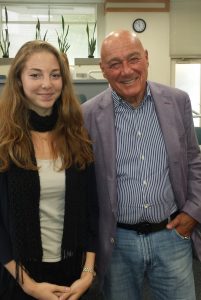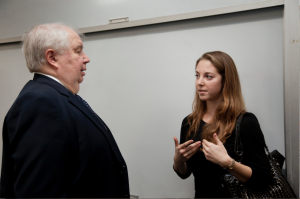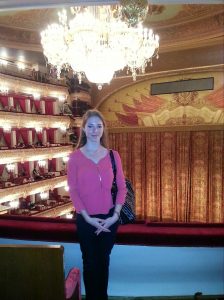Story written by Julia Diamond, NPTS, ’17
 For me, Russian language has been a key to answering many questions about the relationship between Russian and Soviet societies and their domestic and foreign policies. Aside from always having a Russian gymnastics coach and ballet teachers, I became especially motivated to learn Russian after participating in a Russian ballet summer intensive in 2009. While we found ways to communicate, I always wanted to be able to understand and speak their language to discover what to me were secrets of their culture and outlook.
For me, Russian language has been a key to answering many questions about the relationship between Russian and Soviet societies and their domestic and foreign policies. Aside from always having a Russian gymnastics coach and ballet teachers, I became especially motivated to learn Russian after participating in a Russian ballet summer intensive in 2009. While we found ways to communicate, I always wanted to be able to understand and speak their language to discover what to me were secrets of their culture and outlook.
This is a program in which Moscow State Academy of Choreography (also known as the Bolshoi Ballet Academy) teachers and some dancers come to the U.S. to teach American students. A few of the teachers and many of the students did not speak English fluently.
Several years later, in a Moscow supermarket I had a life-changing language  experience. While the checkout girl rang up the purchases of the man in front of me, the man exchanged a joke with the girl in Russian. It was a joke I had heard my father make almost my entire life. I laughed and all of a sudden the man and everyone around me seemed so familiar. I felt more strongly than ever a shared sense of humanity, and that my hard work had begun to pay off. It was then that I understood more deeply the reason I was studying this language – to be able to understand and connect on the most basic level (human to human) with people from a country many in the U.S. today consider an enemy.
experience. While the checkout girl rang up the purchases of the man in front of me, the man exchanged a joke with the girl in Russian. It was a joke I had heard my father make almost my entire life. I laughed and all of a sudden the man and everyone around me seemed so familiar. I felt more strongly than ever a shared sense of humanity, and that my hard work had begun to pay off. It was then that I understood more deeply the reason I was studying this language – to be able to understand and connect on the most basic level (human to human) with people from a country many in the U.S. today consider an enemy.
 Understanding the language has allowed me to make Russian friends and learn the various political opinions by listening to Russian political debate and interview television programs. I am able to hear viewpoints similar to some in the U.S. as well as some sides of international stories that are never heard in this country. I learned there are some in Russia who understand U.S. domestic issues and some who do not.
Understanding the language has allowed me to make Russian friends and learn the various political opinions by listening to Russian political debate and interview television programs. I am able to hear viewpoints similar to some in the U.S. as well as some sides of international stories that are never heard in this country. I learned there are some in Russia who understand U.S. domestic issues and some who do not.
Learning how to form a Russian sentence requires the mind to work differently. You use different thought processes to form ideas and translate them. This allows you access to all sorts of treasures, like old Russian poetry and prose. These help understand Russian history and viewpoints of those who grew up in Russia and the Soviet Union. While learning Russian, you must also learn “anecdotes” which Russians often reference, even in political debates. Only with this is it possible to truly understand the sentiments they express.
 I am sure having Russian language skills and experience studying the language will benefit me in my future career. Knowing a language allows a person to communicate with native speakers of that language on a deeper level. For my career in international relations, the ability to speak Russian fluently and understand Russian culture will allow me to communicate and form deeper human connections with Russian nationals than might be possible in today’s diplomatic language, English.
I am sure having Russian language skills and experience studying the language will benefit me in my future career. Knowing a language allows a person to communicate with native speakers of that language on a deeper level. For my career in international relations, the ability to speak Russian fluently and understand Russian culture will allow me to communicate and form deeper human connections with Russian nationals than might be possible in today’s diplomatic language, English.

